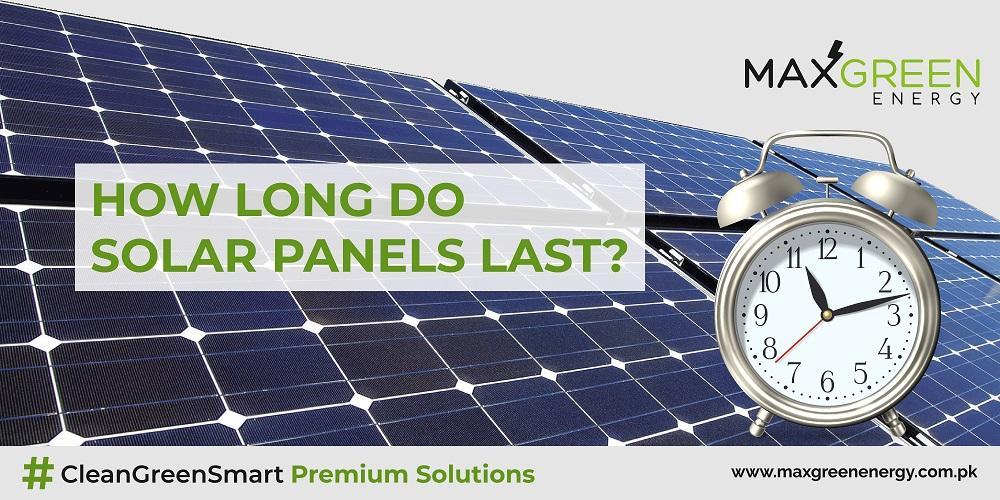Solar panels are becoming increasingly popular as an alternative form of energy. It’s greener, environmentally friendly, and also does not produce any emissions. Plus, the maintenance is minimal, and the lack of moving parts means that they are much less likely to break down. The warranty periods tend to be quite long as well, due to the life expectancy of the average solar panel – something that is detailed further on this page. This article not only details how long solar panels last but also how you can keep them from deteriorating.
How Long Do Solar Panels Last?
Due to rising energy bills and a growing desire to reduce our carbon emissions and impact on the environment, solar panels are becoming an increasingly popular format for the provision of energy to homes in Pakistan. The latest solar panel models on the market have an expected lifespan of 40-50 years, and warranties that will keep them protected for at least half of that time.
The warranties also act to guarantee the performance levels of the solar panels over the course of the first half of their lives. Most warranties will guarantee that the performance will not drop below 80% before the warranty ends. In fact, some panels have been known to remain over 80% efficient even past the end of their lives.
If you take good care of your solar panels, then they could easily last over 40 years after being installed. However, it is essential to remember that their performance levels will have deteriorated slightly over that time period. The life expectancy of around half a century includes both monocrystalline and polycrystalline solar panels. The reason that thin film is not included is that we don’t yet know just how long their estimated lifespan is, and this is why their warranties also tend to be shorter.
Please note that the size and wattage of a system should never impact its lifespan.
The Causes of Degradation
Crystalline silicon modules that are located in extreme climates have shown higher degradation rates than those in moderate ones. For climates that were very cold, panels that were subjected to heavy snow and wind tended to suffer the most. Similarly, panels that were installed on a façade in the same climate showed very low rates of degradation as the snow load was eliminated.
On the other side of the climate spectrum, solar panels in desert climates displayed large decreases in production over time (close to 1% per year) due to the high levels of UV exposure. This decrease is massive compared to moderate climates, which tend to be around 0.2% per year. Panels in moderate climates tend to be able to retain 96% of their production capabilities after 20 years.
How to Extend Their Life
Solar panels have been designed and built to handle as well as endure harsh and unpredictable weather conditions over prolonged periods of time. This is why solar panels are so durable and little to no maintenance is required over the course of their life. Generally speaking, if you keep the panels clean and in good condition, they should be working at high levels of efficiency for quite some time.
It is also important to check the panel output on a regular basis, either via the inverter or on your monitoring system. This means that if the output turns out to be less than the expected amount, you will be able to find out why that is quickly and get your panels back to running at optimum levels of efficiency.
It is also incredibly important that you ensure your solar panels are installed correctly, allowing them to run effectively and to the best of their capabilities. This is why you should always use a reliable company like MaxGreen for the installation of your solar panels, and you should ensure your installer is a qualified and experienced professional.
Another thing to note is that solar panels are only as good as their inverter. The traditional string inverters tend to have a shorter lifespan than solar panels (typically around 10-15 years). If your inverter is preventing the maximum amount of energy from being processed, you will not be getting the most out of your solar panels. Make sure you keep your inverter up to date and in good condition if you want to receive the full benefits from your solar panels.
How to Maintain Them
If you keep your solar panels well maintained, then you can expect to enjoy them for the full length of their estimated lifespan. There are a few ways in which you can do this, helping the efficiency levels to stay at their best.
While solar panels should be pretty much self-sufficient after installation, an annual (or biannual) clean can really help them stay maintained. It is important to note that you only need to give your solar panels a good clean once or twice a year, but if you have had a long period with no rain, you may want to give them an extra once over.
Want to Know More?
Have you found yourself interested in solar panels? If you want to know more then make sure to contact us we will love to offer you free consultation in taking your next step to clean, green, smart energy.


